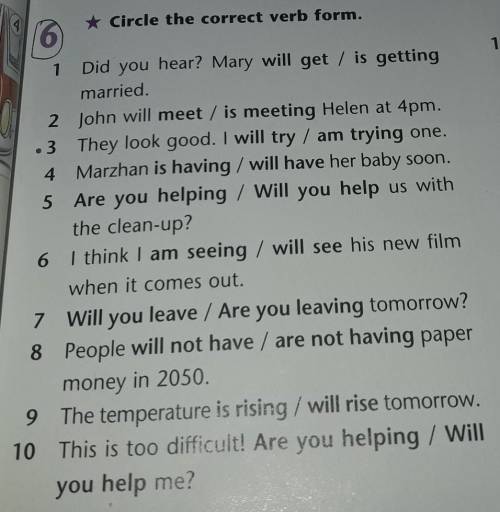4. * Circle the correct verb form.
Did you hear? Mary will get / is getting
married.
2 John will meet / is meeting Helen at 4pm.
.3 They look good. I will try / am trying one.
4 Marzhan is having / will have her baby soon.
5 Are you helping / Will you help us with
the clean-up?
6 I think I am seeing / will see his new film
when it comes out.
7 Will
Will you leave / Are you leaving tomorrow?
8 People will not have / are not having paper
money in 2050.
9 The temperature is rising / will rise tomorrow.
10 This is too difficult! Are you helping / Will
you help me?

Другие вопросы по теме Английский язык
Популярные вопросы
- Сторони першого трикутника дорівнюють 16 см, 10 см, 12 см. найменша...
3 - 12. змішали розчин калій гідроксиду масою 300 г з масовою часткою...
1 - Укажите форму числительного....
3 - Найдите определитель матрицы: [tex]\left[\begin{array}{}3& -1&...
3 - Решите таблицами, а то мне будет плохо. 100...
3 - Яку масу води потрібно долити до 150 г розчину з масовою часткою розчиненої...
2 - Прочитано 126 страниц книгиа всего страниц 287сколько процентов прочитано?...
1 - Как в паскале зациклить программу? то есть как выполнять одну и ту...
1 - Яку силу треба прикласти до другого кінця важеля, щоб зрівняти його....
2 - Осуществить превращение согласно схеме:...
2
Explanation: In this sentence, we are talking about a future event that is already planned or scheduled. Therefore, the correct verb form is "is getting" because it indicates an action that is going to happen in the future.
2. John will meet / is meeting Helen at 4pm.
Explanation: This sentence also refers to a future event that is already planned and scheduled. The correct verb form is "will meet" because it shows that the action is going to take place in the future.
3. They look good. I will try / am trying one.
Explanation: In this sentence, we are talking about a personal intention or plan. The correct verb form is "will try" because it indicates the speaker's intention to do something in the future.
4. Marzhan is having / will have her baby soon.
Explanation: This sentence talks about an event that is expected to happen in the future but has already been planned or arranged. The correct verb form is "is having" because it shows that the action is happening in the future but has already been scheduled.
5. Are you helping / Will you help us with the clean-up?
Explanation: This sentence is asking for assistance in the future. Both "Are you helping" and "Will you help" are grammatically correct, but the choice depends on the speaker's intention. If the speaker is asking for immediate assistance, "Are you helping" would be more appropriate. If the speaker is asking for help in the future, "Will you help" would be more suitable.
6. I think I am seeing / will see his new film when it comes out.
Explanation: In this sentence, the speaker expresses their intention to watch a film in the future. Both "am seeing" and "will see" are grammatically correct, but the choice depends on the speaker's certainty. If the speaker is more certain about their plan, "am seeing" is more appropriate. If the speaker is less certain, "will see" would be more suitable.
7. Will you leave / Are you leaving tomorrow?
Explanation: This sentence is asking about someone's future departure. Both "Will you leave" and "Are you leaving" are grammatically correct, but the choice depends on the speaker's intention. If the speaker is asking for confirmation about a planned departure, "Will you leave" would be more appropriate. If the speaker is inquiring about someone's current departure plans, "Are you leaving" would be more suitable.
8. People will not have / are not having paper money in 2050.
Explanation: This sentence talks about a future prediction or expectation. The correct verb form is "will not have" because it indicates a future state or condition.
9. The temperature is rising / will rise tomorrow.
Explanation: This sentence refers to a future change or event. Both "is rising" and "will rise" are grammatically correct, but the choice depends on the speaker's context. If the speaker is referring to an ongoing process or current observation, "is rising" would be more appropriate. If the speaker is making a prediction about the temperature in the future, "will rise" would be more suitable.
10. This is too difficult! Are you helping / Will you help me?
Explanation: In this sentence, the speaker is asking for immediate assistance. Both "Are you helping" and "Will you help" are grammatically correct, but the choice depends on the speaker's intent. If the speaker is asking for immediate help, "Are you helping" would be more suitable. If the speaker is asking for future assistance, "Will you help" would be more appropriate.